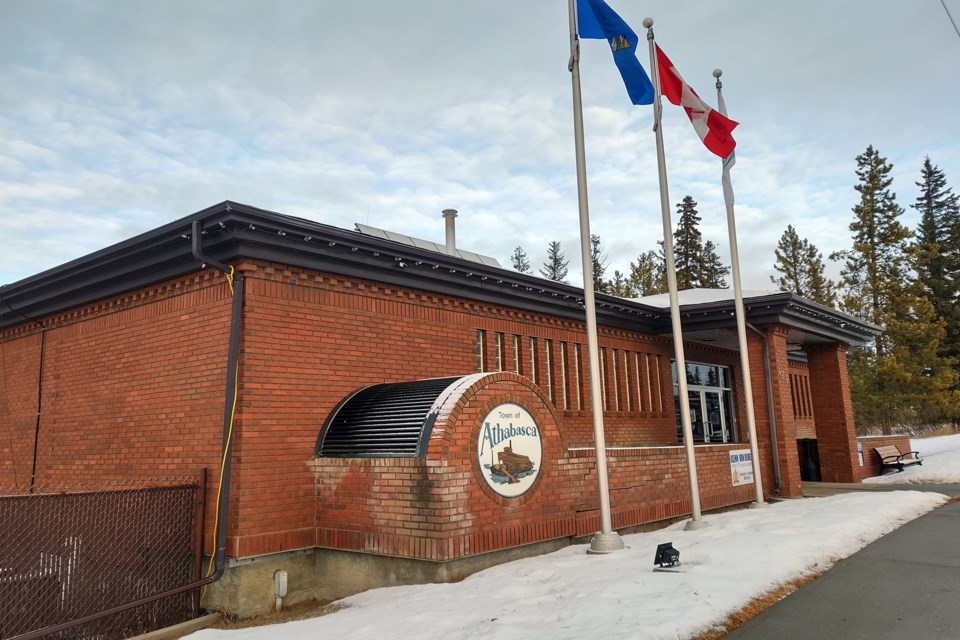ATHABASCA – Ratepayers in the Town of Athabasca won’t see an increase to their property taxes this year, but there will be a number of challenges to overcome in the next few years.
Councillors had a final look at the 2021 operating and capital budgets at their March 15 meeting and approved both unanimously after chief financial officer (CFO) Jeff Dalley went over some of the highlights in a short presentation.
Dalley said he expects operating revenues of $9.974 million this year, with $11.289 million in expenditures. The operating budget covers salaries, contracted services, maintenance, supplies and debt servicing. More than a quarter of proposed expenditures, 27.7 per cent, are related to water supply and distribution; roads, streets, sidewalks and lighting account for 16 per cent; amortization takes up 14 per cent; while the Athabasca Regional Multiplex and administration costs account for 11 per cent each.
The capital budget, which is set at $1.312 million for 2021, helps municipalities build roads, parks, town facilities and utility infrastructure, as well as purchase equipment and fleet vehicles.
Federal Gas Tax (FGT) funding will cover $178,000 of the capital budget, and Municipal Sustainability Initiative (MSI) funding will cover $836,083. The remaining $297,917 will come out of the town’s reserves. While MSI funding will increase in 2021, the next two years will see significant decreases.
“We have a challenge with aging infrastructure with low reserves to cover additional spending. So, we don't have a lot of reserves, but a lot of our equipment and infrastructure are aging,” said Dalley.
That, along with continuing COVID-19 costs, an increase of 9.15 per cent in insurance costs, and a 2.2 per cent inflation rate in Alberta, new savings and/or revenue will need to be found when a new mayor and council take their seats in late October.
Rural and small urban municipalities are still adjusting to paying for police in their towns as well. Last year was the first the town was obligated to pay for police as it was previously exempt as an urban municipality with a population under 5,000. In 2020, that cost was $58,176; in 2021, it’s $87,326; and by 2024 it will increase to $174,652, which will have a direct effect on residential tax rates, said Dalley.
Mayor Colleen Powell commented during her March 18 online interview with the Athabasca Advocate, Town Talk LIVE!, that this cost should rightfully be considered another requisition, just like education or seniors and social housing, but it’s not, and that is a problem for her.
“This year, it's $87,000 that we have to take out of our property taxes, and send to Edmonton, but they will not allow us to put it on as a requisition, which is exactly what it is, and that annoys me. That amount is going up to $174,000 in two years,” she said.
During the same interview, Powell also noted assessment values went up slightly in 2020 as well. The residential rate went up by 1.17 percent, while non-residential was up by 0.7 per cent. Machinery and equipment remain unchanged for 2021.
“Your tax bill includes town taxes at a mill rate of 8.51. So, if you take your assessment and multiply it by 8.51 then stick the decimal point in the right place, you will find out how much your taxes should be in case there is an error. On a $100,000 house, you would be paying $851,” she explained.
Back at the council meeting, Dalley also pointed out two per cent increases in franchise fees from both Fortis and Alta Gas, along with an increase of five per cent for the cost of water from the Aspen Regional Water Services Commission, which will show up on town water bills.
The town did manage to find some savings throughout 2020 though, he said, with no increases to council remuneration or the cost-of-living allowance for staff, the reduction of one councillor partway through the year, reduced overtime and an increase in grant funding due to COVID. The pandemic also saw a decrease in costs of 16.6 per cent at the Multiplex.
Not surprisingly, the largest capital purchases for 2021 are in public works ($455,000) and sewer ($456,000).
The single largest cost is in the sewer budget, with sanitary main re-lining coming in at $200,000, of which, the town will contribute $169,417 from reserves and MSI will cover the remaining $30,583. Other projects in that department include aeration head replacements ($66,000 and $65,000 from FGT funding respectively), $70,000 for manhole rehabilitation and $45,000 for sanitary service t-liners, from MSI.
Under public works, road rehabilitation on 44th Ave. Between 53rd and 54th St. is covered by $150,000 from MSI; 52nd St. will also see some of its own rehab with $115,000 from MSI. That funding will also cover a $50,000 storm drain replacement, and another $40,000 will go toward pavement rehabilitation, both from MSI dollars. The town’s annual allotment of $100,000 will also come out of reserves.
Additionally, the Jubilee Booster Station looping project will be completed for $165,500 (MSI) to provide consistent water pressure for residents in the area; the fire department will see a new boiler installed for $45,000 (MSI); a new bridge on the Muskeg Creek Trail will cost $75,000 (MSI); while $50,000 (MSI) will be set aside for Multiplex projects; and $25,000 (FTG) will go toward repairing the stage at Riverfront Park.


